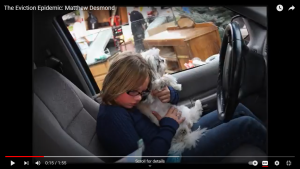3.1 Chapter Overview and Learning Objectives
3.1.1 Learning Objectives
- Practice developing research questions and recommending research methods appropriate for different research questions.
- Describe and explain the scientific method, how sociology has been constructed as a science, and how the scientific method is used in sociological research.
- Describe the function and importance of interpretive and critical frameworks.
- Describe the differences in accuracy, reliability and validity in a research study.
- Explain the basics and limitations of survey research, experimental research, field research, qualitative interviewing, secondary data analysis, and community/participatory research research.
- Differentiate between qualitative and quantitative methods.
- Justify why ethical standards exist.
- Demonstrate awareness of the American Sociological Association’s Code of Ethics

We open this chapter with a brief introduction to what American sociologist Matthew Desmond refers to as the eviction epidemic. His research allows us to identify structural barriers that increase the experience of houselessness. Let’s take a closer look at Rosemary’s story to understand how eviction can disrupt connections to community and education. Imagine trying to keep up with your school work, while you and your family are struggling to keep a stable home. Many people maintain certain beliefs about someone who “gets evicted.” They might suggest those people are responsible for their circumstances given the poor choices the evicted person made.
Sociologists use a broader lens to examine social life; instead of solely focusing on individuals choices, we also study how social structures limit and create opportunities for groups. We step back from experiences at the individual level to identify how those experiences are indicative of larger patterns in our world. Often those patterns intersect with inequalities.
Sociologists conduct research to systematically understand a wide range of social issues, including housing. Matthew Desmond (2016) used ethnographic research methods to learn more about how eviction impacts families in the United States. He observed eight families in Milwaukee during the 2007–2008 financial and housing crises as they struggled with evictions. He wrote about their experiences in his book, Evicted: Poverty and Profit in the American City and combined his ethnographic fieldwork with statistical analysis. He found that eviction was prevalent in low-income communities and caused families to experience poverty.
By examining the lives of families struggling with substandard housing conditions and evictions, Desmond uncovers information that helps us have a better understanding of how poverty and economic exploitation intersect with access to housing. As Desmond shares in the PBS interview, “Eviction isn’t just a condition of poverty, it’s also a cause of it. It’s making things worse.” Eviction isn’t about one or two “bad choices”—often there are several situations that occur, placing renters in vulnerable positions with limited options. Even though Milkwaukee has renter protections, for some landlords it was cheaper to evict tenants than keep their building up to code. If tenets were taken to eviction court and lost, their eviction records limited future housing options.
Desmond’s research humanizes the experience of eviction but also demonstrates how structural inequalities put groups of people at a disadvantage. The consequences of eviction on families affects mental and physical health. Social science research enables us to see the complexities of the issues surrounding the housing crisis. In this chapter you will learn more ways to use research methodology to analyze the world around you from a sociological perspective.
You can learn more about Desmond’s research in this seven minute interview with PBS here: The stories behind the unseen eviction crisis [YouTube].
3.1.2 Licenses and Attributions for Overview
“Overview” by Jennifer Puentes is licensed under CC BY 4.0.
Chapter opening image screenshot of a child holding a dog while sitting in a car. Household belongings are placed outside the home. Screenshot from The Eviction Epidemic: Matthew Desmond (c) The Eviction Lab. License Terms: Standard YouTube license.
Figure 3.1 “The Eviction Epidemic.” (c) The Eviction Lab. License: Standard YouTube License.
“Rosemary: A Life Disrupted.” (c) The Eviction Lab. License Terms: Standard YouTube License.
“The stories behind the unseen eviction crisis.” (c) PBS NewsHour. License Terms: Standard YouTube license.
